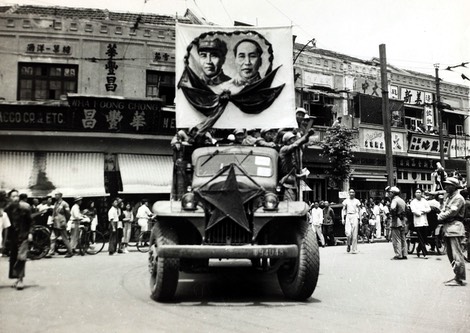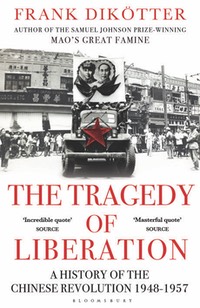Literary Review, 1 September 2013
'In brutal fact, between 1959 and 1962, at least forty-three million Chinese died during the famine ... The cause of this disaster, the worst ever to befall China and one of the worst anywhere at any time, was Mao.' I wrote those words in these pages when reviewing Frank Dikötter's Mao's Great Famine: The History of China's Most Devastating Catastrophe, 1958-62; I now see that both those words and Dikötter's title were mistaken. The Chinese famine was indeed one of the worst in world history, but the real disaster for China, until his death in 1976, was Mao himself, the man whose gigantic portrait still gazes down from Beijing's Forbidden City onto Tiananmen Square.
This is clearer than ever in Dikötter's path-breaking new book on the years 1945 to 1957, the period that the Chinese call 'Liberation'. Beyond everything else, he shows us that Mao 'liked killing', as Li Rui, one of his secretaries, put it some years ago to a Harvard symposium on the Chairman. From the 1930s, Mao began persecuting and killing his adversaries; once he was snug in his guerrilla headquarters in Yan'an, intellectuals were left in no doubt about what the Great Teacher expected and what would happen to them if they deviated, to use one of the Communist Party's favourite terms for disagreement.
The Tragedy of Liberation, writes Dikötter, 'is first and foremost a history of calculated terror and systematic violence'. Calculated and systematic, indeed: very soon after 1949 Mao set a quota for executions of 'class enemies', 'counter-revolutionaries' and 'black elements'. With the help of henchmen such as Deng Xiaoping (than whom no one was more keen to kill), these ratios - sometimes fewer than two per thousand, sometimes rather more - were extended throughout the country. Since there were already over half a billion Chinese, the number of deaths in the first years of Liberation, even before the famine of 1958-62, was enormous.
First there were the so-called landlords. In the 1920s the agronomist John Lossing Buck (Pearl Buck's first husband) showed, in Dikötter's words, that 'over half of all farmers were owners, many were part-owners, and fewer than 6 per cent were tenants ... Tenants were not generally much poorer than owners.' But Mao learned from Stalin, who had slaughtered the kulaks, and outdid him. 'In a pact sealed in blood between the party and poor, close to 2 million so-called "landlords", often hardly any better off than their neighbours, were liquidated.' I say 'outdid him' because, as Dikötter shows throughout his chilling narrative, whereas Stalin usually relied on 'the organs' to do his bloody work, Mao induced the Chinese to turn on each other, something well documented during the Cultural Revolution in the 1960s and 1970s, but already common from 1950. During the Great Terror of 1951, 'close to 2 million people had been murdered, sometimes during public rallies in stadiums, but more often than not away from the public eye, in forests, ravines, besides rivers, alone or in batches'.
'Mao emphasised that the terror should be "stable" (wen), "precise" (zhun) and "ruthless" (hen)', writes Dikötter. 'But before anything else,' said Mao, 'the term "ruthless" has to be emphasised.' He got what he demanded. Dikötter rightly revives the words 'willing executioners', previously used about Germans who helped to murder Jews, to apply not only to many poor Chinese who killed their slightly better-off neighbours, and to local apparatchiks, but also to Mao's closest comrades, such as Zhou Enlai, who retains his reputation as a near-saint, and Deng Xiaoping:
Nobody merely acted under orders, as leaders created their own guidelines, trying to guess what was required of them ... Deng Xiaoping, for instance, suggested in February 1951, that between half and two-thirds of all counter-revolutionaries be executed. Mao approved, on condition that the killings be 'secretly controlled, without disorder or mistakes'.
The purges went on in the major cities as well, where plenty of people did not wait for the killers to come for them. In Shanghai in 1952, '644 people killed themselves in two months, or more than ten daily - if one can trust the statistics the party compiled'.
By 1953, Mao's sadistic diktats had reached ever greater heights, and peasants lost their land and worked sullenly in cooperatives. Here Dikötter tells us one of the many things in his book I didn't know:
Famine stalked large swathes of the countryside. In the spring, 3 million people in Shandong went hungry. Five million people were destitute in Henan, close to 7 million in Hubei and another 7 million in Anhui ... In Guizhou and Sichuan desperate farmers sold the seeds on which their next crop depended ... In many of these provinces desperate parents even bartered their children ... many reports also pointed the finger at brutal grain levies as well as incompetence, if not callous indifference, on the part of local cadres.
Dikötter gives plenty of space to Thought Reform, 'the Auschwitz of the Mind', as it has been called, and mentions three of its American victims, long-ago colleagues of mine: Harriet Mills and Allyn and Adele Rickett. Fulbright Fellows in Beijing, they were imprisoned for several years immediately after Liberation and emerged from their ordeals as keen Maoists. Another friend, Robert Ford, the Dalai Lama's radio operator, was detained for four years after the Chinese occupation of Tibet and has described what happened to his mind: 'when you're being spiritually tortured by thought reform, there's nowhere you can go. It affects you at the most profound, deepest levels and attacks your very identity.' Although Maoism has disappeared in some of its forms, the Auschwitz of the Mind remains. Many young Chinese, parroting the official line, maintain that what happened in Tiananmen Square on 3-4 June 1989 was a 'riot in which bad people shot our police and soldiers'.
Some of what Dikötter describes has been known in general terms, but what he has done here - as when he was writing about the later famine - is take advantage of the opening of archives in which first-hand official reports and accounts of death in all its forms, together with the myriad other forms of Maoist horror, can now be read unedited. It will be increasingly difficult for Western China specialists to write with authority based only on previous Western publications or on Chinese public statements. We remain in Frank Dikötter's debt.

